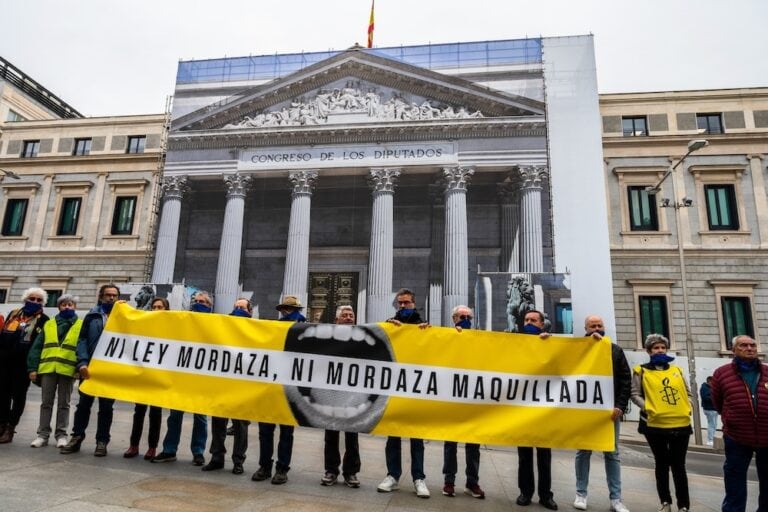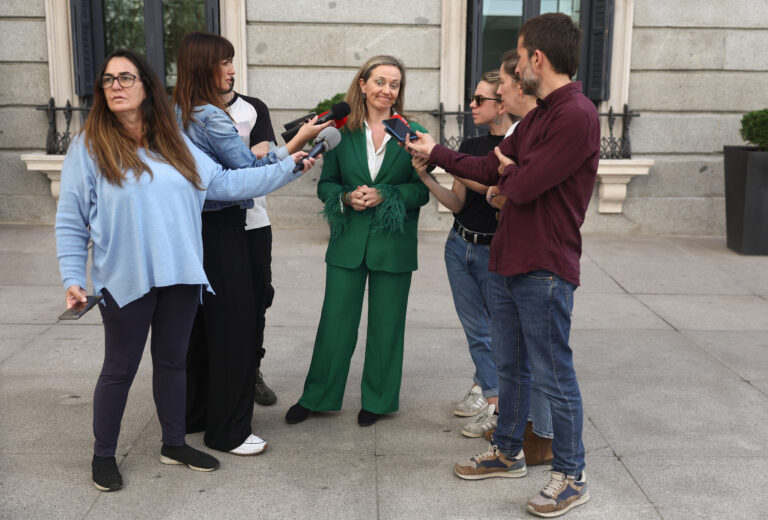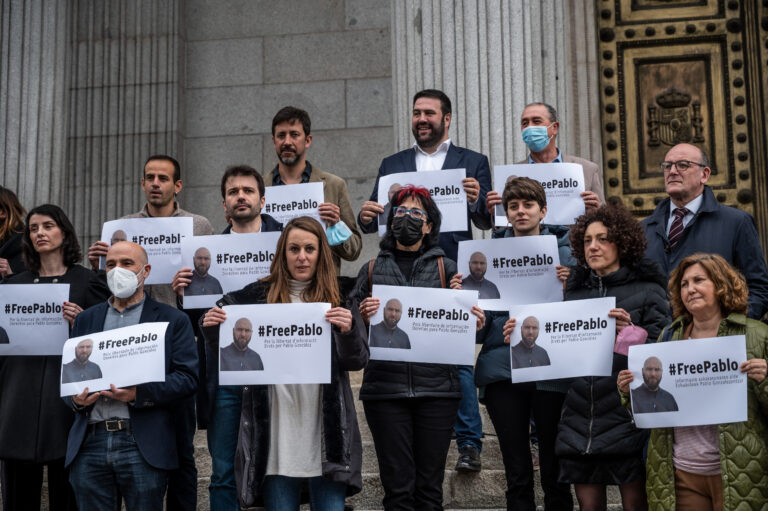(WPFC/IFEX) – The following is a 27 February 2006 WPFC press release: WORLD PRESS FREEEDOM COMMITTEE REPRESENTATIVES TESTIFY BEFORE SPAIN’S SENATE They Recommend the Elimination of Two Arbitrary Laws Reston, Virginia, USA, Feb. 27, 2006 – Two top representatives of the World Press Freedom Committee, (http://www.wpfc.org) an organization comprising 45 press freedom groups in six […]
(WPFC/IFEX) – The following is a 27 February 2006 WPFC press release:
WORLD PRESS FREEEDOM COMMITTEE REPRESENTATIVES TESTIFY BEFORE SPAIN’S SENATE
They Recommend the Elimination of Two Arbitrary Laws
Reston, Virginia, USA, Feb. 27, 2006 – Two top representatives of the World Press Freedom Committee, (http://www.wpfc.org) an organization comprising 45 press freedom groups in six continents, during a public hearing urged a Spanish Senate committee to either eliminate or reform two arbitrary laws that have been used to unjustly indict and convict two Spanish journalists for truthfully reporting an event.
WPFC’s Executive Director Mark Bench and Projects Director Javier Sierra testified before the Committee on the Information Society and Knowledge earlier this month about the case of journalists Jose Luis Gutiérrez and Rosa María López. In 1995 both were charged with insulting the honor of then King of Morocco Hassan II after López reported the seizure in southern Spain of a truck belonging to the Moroccan Royal Crown that was loaded with five tons of hashish.
By virtue of the 1966 Press and Printing Law – a held-over statute from the Franco dictatorship – not only was López, the reporter, indicted but also her editor-in-chief, Gutiérrez, and their entire newspaper, the now banned Diario 16. The other piece of legislation used to indict these professionals was the 1982 Law to Protect One’s Honor, which is at the disposal of any person in Spain who feels insulted by the truth.
Bench and Sierra testified that the two convicted journalists have been the targets of a decade-long judicial harassment initiated by the head of an autocratic foreign government who felt insulted by a newspaper article that was “truthful,” as the Spanish courts have acknowledged. Even so, three Spanish courts, including the Supreme Tribunal, ruled for the plaintiff. The case has been appealed to the country’s top court, the Constitutional Tribunal.
Bench and Sierra testified that these two laws violate the Spanish Constitution and fundamental international treaties and jurisprudence.
“The Press and Printing Law and the Law to Protect One’s Honor fail miserably in their supposed protection of rights to personal and state honor, disregarding entirely the protection of the right to free expression guaranteed by Article 19 of the Universal Declaration of Human Rights and Article 10 of the European Convention of Human Rights and Fundamental Freedoms,” declared Sierra before the committee.
Bench and Sierra argued that these two laws are an open challenge to the jurisprudence of the European Court of Human Rights – whose jurisdiction Spain, a member of the European Union, acknowledges. The Court has repeatedly ruled against the judicial foundations of this kind of laws and that any restriction to free speech “must be narrowly construed and its need established with convincing clarity,” they said.
Sierra used Article 64 of the Press and Printing Law as crucial evidence that these statutes do not comply with the requirements of the European Court’s jurisprudence. The article gives the State the right to shut down any media outlet whose reporting is “contrary to the unity of Spain,” “demerits” the Royal Family or “attacks the prestige” of the Armed Forces.
“It is entirely impossible for a speaker to know when speaking or writing whether his or her words will offend a member of the Royal Family or be construed as verbiage that would be considered ‘contrary to the unity of Spain’,” Sierra said. “This will result in, at best, self-censorship and, at worst, punishment for speech that was never intended to insult, but was interpreted as such. In either sense, more speech is punished than necessary.”
At the core of the WPFC presentation – based on the writings of its General Counsel, Kevin Goldberg – was the danger these laws, with their undue protection for public officials, pose to free speech and transparency in any society.
“[These laws] ultimately allow for harassment of the media by public officials who simply disagree with critical statements that are made about their performance,” testified Sierra. “As the United Nations Commission on Human Rights has expressed, laws shielding public officials from criticism simply result in ‘extensive occurrence of detention, long term detention, persecution and harassment’.”
Bench and Sierra also emphasized that public officials need to acknowledge the fact that in a democratic society they will be exposed to more, not less, criticism from the public.
“The reputation or honor of a public official does not need or merit special protection. Public officials have a unique standing within a population. The positions of power and access to the media possessed by public officials allow them to respond more readily, and with more impact, to criticism than can the private citizen,” they said.
They concluded by recommending the elimination or reform of these laws because they are based “on an autocratic mentality that fails in its duty to serve the common good by protecting any person who feels insulted by the truth.”
The hearing took place upon the invitation of the Senate Committee and attracted extensive media attention. Spain’s largest TV National network, TVE1; national radio networks Onda Cero and COPE; Spain’s two largest newspapers, El País and El Mundo; the country’s largest financial daily, Expansión, among other media outlets, covered the WPFC testimony and its overall mission to Spain.
The World Press Freedom Committee is an international umbrella organization that includes 45 journalistic groups – print and broadcast, labor and management, journalists, editors, publishers and owners on six continents – united in the defense and promotion of press freedom. The WPFC primarily focuses on monitoring threats that develop at UNESCO, the UN and other parts of the UN system; promoting a global common front against restrictions on news through leadership of a worldwide Coordinating Committee of Press Freedom Organizations; facilitating joint action and administering shared projects, and seeking to ensure press freedom is a primary consideration for the Internet and other new media.


